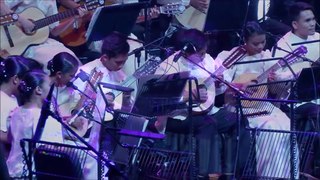Related Research Articles

Maria Lea Carmen Imutan Salonga, known professionally as Lea Salonga, is a Filipina singer, actress, columnist, and producer. Dubbed the "Pride of the Philippines," she is best known for her roles in musical theatre, for supplying the singing voices of two Disney Princesses, and as a recording artist and television performer. Throughout her career, she has achieved numerous accolades and honors, becoming an internationally-recognized figure in music and entertainment.
Ilocano literature or Iloko literature pertains to the literary works of writers of Ilocano ancestry regardless of the language used - be it Ilocano, English, Spanish or other foreign and Philippine languages. In Ilocano language, the terms "Iloko" and "Ilocano" are different. Generally, "Iloko" is the language while "Ilocano" refers to the people or the ethnicity of the people who speak the Iloko language.

The Ilocanos, Ilokanos, or Iloko people are the third largest Filipino ethnolinguistic group. They mostly reside within the Ilocos Region, in the northwestern seaboard of Luzon, Philippines. The native language of the Ilocano people is the Ilocano language.

Raymundo Cipriano Pujante Cayabyab, known professionally as Ryan Cayabyab, is a Filipino musician, composer and conductor. Regarded as one of the pillars and icons of Original Pilipino Music (OPM). He was the Executive and Artistic Director for several years for the defunct San Miguel Foundation for the Performing Arts. He was named National Artist of the Philippines for Music in 2018.

Philippine Idol is the first version of the Idol series in the Philippines, the 35th country in the world to air a local Idol adaptation and the sixth in Asia broadcast by ABC 5. Similar to the premise of original show Pop Idol, Philippine Idol aims to find the best singer in the country who can be defined as the "national" singer. Local television personality Ryan Agoncillo hosted the program. Ryan Cayabyab, Pilita Corrales and Francis Magalona were also judges of the show. Agoncillo, Corrales and Magalona auditioned to be part of the program, while Cayabyab was chosen by the program's producers. Meanwhile, actress Heart Evangelista hosted the daily updates program I ♥ Philippine Idol: Exclusive. Composer Mel Villena was the show's musical director.

Gerard Imutan Salonga is a Filipino musical conductor, composer, and arranger. From 2012 to 2020, he was the music director of the ABS-CBN Philharmonic Orchestra, assistant conductor of the Hong Kong Philharmonic Orchestra from 2016 to 2018, and from 2019 to the present the resident conductor of the Malaysian Philharmonic Orchestra.
Boyfriends is a musical group from the Philippines. Their heyday was in the 1970s as one of the most prominent bands of the Manila sound, with pop and disco harmonies reminiscent of the Bee Gees. Several of their recordings are among the most popular Tagalog and English songs of the Philippines from the late 1970s and early 1980s, and have since been covered by a number of the Philippines' most popular singers, among others.

The Ateneo de Manila College Glee Club (ACGC), simply known as the Ateneo Glee Club, is a choir based in the Ateneo de Manila University, Philippines. It is distinguished as the oldest university chorale in the Philippines, celebrating its 98th season in 2018. It has held concerts internationally, and has released several albums with songs genres ranging from Classical, Negro spiritual, Sacred choral works, as well as Pop, and OPM. The Glee Club remains active internationally through the performances it stages and choral festivals it participates in.
Pinoy pop or P-pop refers to a contemporary pop music in the Philippines originating from the OPM genre. With its beginnings in the late 1970s, Pinoy pop is a growing genre in year of the 2020s. Through the 1990s to the 2000s, Pinoy pop was regularly showcased in the live band scene.
Joey Albert is a Filipino singer, songwriter and lyricist. An alumna of St. Theresa's College Manila and Assumption College San Lorenzo, she began her professional singing career in 1981. In 1982, she was proclaimed winner of the Dream Girl Filipina contest on The Party, a television program hosted by Ariel Ureta over the now defunct Banahaw Broadcasting Corporation. Albert became a member of The New Minstrels, a popular Philippine show band during the 1970s and the 1980s. Apart from Albert, The New Minstrels also produced many other outstanding Filipino musical artists.
Manang Biday is a traditional Ilocano folksong in Northern Luzon, particularly in the province of Ilocos. This song implies the courtship of a young maiden named Manang Biday. Serenading a love interest is a custom of the Filipinos. Until today, it is still practiced by the Ilocano. It is also a courtship dance. "Manang Biday" was originally composed by Florante Aguilar.

The 2019 Southeast Asian Games, officially known as the 30th Southeast Asian Games, or the 30th SEA Games, and commonly known as Philippines 2019, was the 30th edition of the Southeast Asian Games, a biennial regional multi-sport event which was held in the Philippines from November 30 to December 11, 2019. However, due to a narrow calendar, some sports started before the opening ceremony as early as November 24.

The ABS-CBN Philharmonic Orchestra is a Filipino radio orchestra based in Manila. It was founded in 2012 with financial support from ABS-CBN Corporation and First Philippine Holdings Corporation. It is composed of 40 instrumentalists. The orchestra's musical director and conductor is Gerard Salonga.
The following is a list of notable events that are related to Philippine music in 2019.

The opening ceremony of the 2019 Southeast Asian Games took place on the evening of Saturday November 30, 2019 at the Philippine Arena, in Bocaue, Bulacan. The event commenced at 19:00 PST (UTC+08:00) and ended at 20:35 local time. Floy Quintos was the creative director of the ceremony. The ceremony featured LED strips and panels, which represent a bamboo forest, and was the first indoor opening ceremony of the Southeast Asian Games.
Atin Cu Pung Singsing is a traditional Filipino folk song from Central Luzon, Philippines in Kapampangan sung by adults and children. The origin of the song is unknown, and there was a debate whether it was pre-historic or colonial. But its melody is most likely from the 18th century as it was similar to Spanish and Mexican folk songs of the era. The folk song, it presents a woman as its main character and a man as a secondary character. The woman in the song was looking for a missing ring given by her mother and offers her love as a prize for the man who could find it.

"Bahay kubo" is a Tagalog-language folk song from the lowlands of Luzon, Philippines. In 1924, it was included in a collection of Filipino folk songs compiled by Emilia S. Cavan.
The 2019 Southeast Asian Games marketing is a long-running campaign that began during the one-year countdown to the games held in Bayanihan Park in Angeles City, Philippines. on November 30, 2018.
"We Win As One" is a song that was used as a theme song of the 2019 Southeast Asian Games in the Philippines. The song was released on September 3, 2019 along with the music video. The song makes the Filipino athletes to compete at the international sporting events to go all-out for the glory and honor of the nation. Produced by Equinox Manila and directed by Shem Hampac, the music video for "We Win As One" shows Ms. Lea Salonga singing with the New Clark City serving as background. The music video also features footage from select SEA Games athletes. The music video is also available for viewing across all SEA Games social media platforms.

Filipina singer and actress Lea Salonga has appeared in international theatre productions, television shows, films, and video games. She made her professional debut on stage in the 1978 Repertory Philippines production of The King and I. She went on to appear and star in productions such as Cat on a Hot Tin Roof (1978), Fiddler on the Roof (1978), Annie (1980), The Sound of Music (1980), The Rose Tattoo (1980), and The Bad Seed (1981) in Manila. In 1981, Salonga made her film debut as Lisa in the Filipino comedy Tropang Bulilit. Salonga continued performing in theatre productions in Manila, including The Goodbye Girl (1982), The Paper Moon (1983), a revival of Annie (1984), and The Fantasticks (1988). From 1983 to 1985, Salonga hosted her own television variety show entitled Love, Lea. In 1986, she also appeared as a Thursday group member on the television series That's Entertainment. Throughout the 1980s, she also appeared in the Filipino films Like Father, Like Son (1985), Ninja Kids (1986), Captain Barbell (1986), Pik Pak Boom (1988), and Dear Diary (1989).
References
- ↑ Yabes, Leopoldo Y.; Calip, José Resurrección (1936). A brief survey of Iloko literature from the beginnings to its present development: with a bibliography of works pertaining to the Iloko people and their language. The Author. p. 10. Retrieved 20 August 2019.
- ↑ The Ilocos Review. Divine Word College of Vigan. 1970. Retrieved 20 August 2019.
- ↑ Guayco, Marion Theodore. Comparison and Contrast: An analysis on Ilocano between American English and Manila Tagalog Wedding Songs. p. 2.
- ↑ Patajo-Legasto, Priscelina (2008). Philippine Studies: Have We Gone Beyond St. Louis?. UP Press. p. 241. ISBN 9789715425919 . Retrieved 20 August 2019.
- ↑ "Culture buffs raise notes on PH regional folk songs". Manila Standard. Retrieved 20 August 2019.
- ↑ https://ejournals.ph/article.php?id=16617
- ↑ https://ejournals.ph/article.php?id=16617
- ↑ https://ejournals.ph/article.php?id=16617
- ↑ https://ejournals.ph/article.php?id=16617
- ↑ Alpad, Christina (December 15, 2018). "Lea Salonga sings in six dialects in new Cayabyab album". The Manila Times. The Manila Times. Retrieved 21 August 2019.
- ↑ Charm, Neil (14 May 2019). "Candon music festival mixes classical and pop | BusinessWorld" . Retrieved 21 August 2019.
- ↑ "pamulinawen mabuhay brass band - Google Search". www.google.com. Retrieved 21 August 2019.
- ↑ Mapeh in Action I' 2008 Ed. Rex Bookstore, Inc. p. 75. ISBN 9789712350115 . Retrieved 21 August 2019.
- ↑ "Pamulinawen Festival". Vigattin Tourism (ARTICLES) - Philippines. Retrieved 21 August 2019.
- ↑ Silliman Journal. Silliman University. 1961. p. 30. Retrieved 21 August 2019.